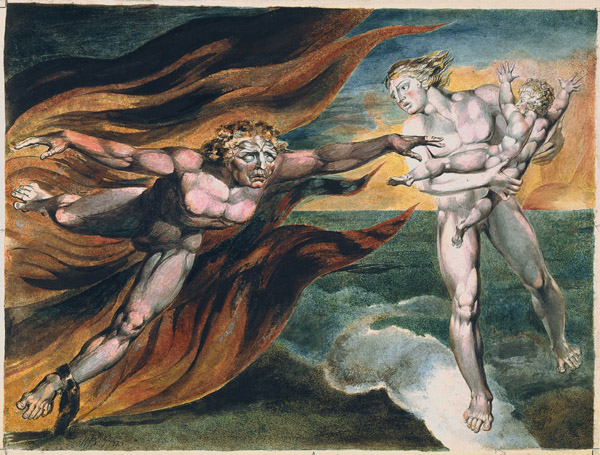Wikimedia
Good and Evil Angels Struggling for Possession of a Child
Original in Tate
In MHH Blake found only two categories of people, whom he called Angels and Devils. He strongly intimated that he belonged to the second category. But when he wrote Milton he described three Classes of Men: the Elect, the Redeemed, and the Reprobate. Blake used these terms ironically; for him they meant something entirely differently than the conventional meanings. In the course of time it became clear that Blake's Elect were the 'holier than thou', the judgmental, the accusers, the punishers, which of course put them in the same class as Satan, the original Accuser.
"For Satan flaming with Rintrahs fury hidden beneath his own mildness....
He created Seven deadly Sins drawing out his infernal scroll,
Of Moral laws and cruel punishments upon the clouds of Jehovah
To pervert the Divine voice in its entrance to the earth
With thunder of war & trumpets sound, with armies of disease
Punishments & deaths musterd & number'd; Saying I am God alone
There is no other!" (Milton, plate 9; (Erdman 203)
The Redeemed were a class of people who believed, under the influence of the Elect that they were convinced of their sin and suffered mightily. In Plates 6 and 7 of Milton Blake defined the three Classes of Men:
"The Web of Life is woven: & the tender sinews of life created
And the Three Classes of Men regulated by Los's hammer.
The first, The Elect from before the foundation of the World:
The second, The Redeem'd. The Third, The Reprobate & form'd
To destruction from the mothers womb: follow with me my plow!
Of the first class was Satan"
Although Satan is here included in the Class of Men, Blake basically defines him as a State (in which everyone may find themselves sometimes).
Jesus belonged to the reprobates; among the reprobates, the transgressors we read in Isaiah 53:
"[8] He was taken from prison and from judgment: and who shall declare his generation? for he was cut off out of the land of the living: for the transgression of my people was he stricken.
[9] And he made his grave with the wicked....
[12] because he hath poured out his soul unto death: and he was numbered with the transgressors;"
And in Milton Plate 13, lines 6 and 7 we read:
"He died as a Reprobate. he was Punish'd as a Transgressor!
Glory! Glory! Glory! to the Holy Lamb of God"
In Milton; Plate 13; Erdman 107 things come out right; it's the Apocalypse:
"The Elect shall meet the Redeem'd. on Albions rocks they shall meet
Astonish'd at the Transgressor, in him beholding the Saviour.
And the Elect shall say to the Redeemd.
We behold it is of Divine Mercy alone! of Free Gift and Election that we live.
Our Virtues & Cruel Goodnesses, have deserv'd Eternal Death.
Thus they weep upon the fatal Brook of Albions River."

2 comments:
beautiful! beautiful! what a beautiful confluence of themes and images! thank you so much!
"in which everyone may find themselves sometimes"
indeed.
the final scene reminds me of that scene of enlightenment and self-recognition at the end of Lewis' "Till We Have Faces" where Orual sees herself and her life as she actually has been.... I need to re-read that book...
Thanks, Susan; I especially appreciate the reference to Till We Have Faces. I need to read it again, too. The first time I had a hard time getting through it,
but that LAST SCENE, my goodness it made the book very worthwhile.
I always thought that Lewis was deeply influenced by MacDonals's Universalism. Wedded to Orthodoxy he could never own it, but TWHF and the Narnia books pretty much attest it.
Post a Comment